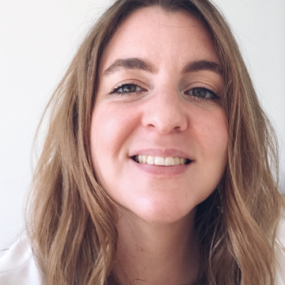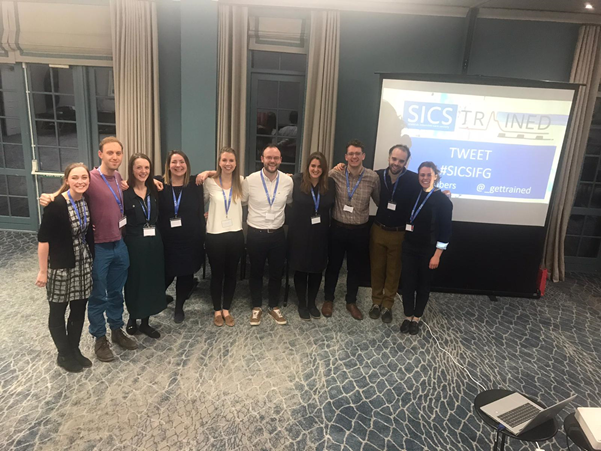TRainee Anaesthetists and INtensivists in EDucation (TRAINED)

Anna is a trainee in anaesthesia and ICM in South East Scotland and the current chair of TRAINED. Outside of work she enjoys reading, yoga and travel.
I had just started a clinical teaching fellowship and was copied into an email:
“Anna will help support the undergraduate [critical care] module this year” …
At the time, I had no idea that this would lead to over 250 students attending voluntary teaching evenings, more than 40 facilitators giving up their time to teach, developing a national conference, or co-founding TRAINED. What a difference a couple of years make.
Where things started...
I’ve been involved in medical education since I was an undergraduate, following a small summer simulation project. I completed a PGCert in Clinical Education during my core training years and, feeling the need to get off the training hamster wheel for a short while, a year as a teaching fellow felt like a natural progression.
I was introduced to Dr Elizabeth Wilson, the undergraduate critical care module lead, and Dr Gilly Fleming, an ICM trainee with an upcoming specialist skills year in education. We were all clear that we wanted to improve things, but were keen to ensure changes would enhance the student experience, and that any intervention was sustainable.
We arranged focus groups with students at the University of Edinburgh, and identified that students felt they lacked formal structured teaching in managing unwell patients, felt overwhelmed, and lacked pastoral support within critical care environments. These findings echo previous studies which have shown that medical students find intensive care an intimidating learning environment, that they do not feel confident in the management of acutely ill patients, and that learning is enhanced when students feel welcomed and supported1-2.
We wanted to de-mystify critical care, ensure students felt supported, and reinforce the generic skills required to manage acutely unwell patients.
Teaching evenings
Tens of meetings, hundreds of emails, thousands of hours spent laminating… I jest, but in all honesty, it took quite a bit of work to get things off the ground.
We’re lucky, in that in the specialties of anaesthesia and ICM, trainees tend to be keen to help out with teaching sessions, and consultants can often be persuaded to, too. We designed a teaching evening with a group of trainees and consultants, and aligned learning objectives to the joint undergraduate framework from the RCoA, FPM and FICM, and to the GMC’s outcomes for graduates3-4.
Evenings include three simulated scenarios on the management of acutely unwell patients, small group sessions on pain and fluid management, a dynamic prioritisation game, and a facilitated debrief focusing on wellbeing. These run concurrently, with small groups of students spending fifteen minutes at each station. This does mean facilitators run the same scenario seven times, but this doesn’t seem to have put anyone off yet!
Over 250 students have attended sessions to date. Feedback has been overwhelmingly positive, and participants enjoy the relaxed and encouraging learning environment, and feel more confident in managing acutely unwell patients. In particular, the wellbeing session is well received and is seen as a unique learning opportunity.
|
“Open, relaxed environment” “Really good session – I feel so much more confident managing acutely unwell patients, pain and fluid prescribing” “It was nice to just sit with peers and have a chat about things like this as it’s not something we as medical students get to do a lot” “We don’t take enough time to think about some of the challenging things we see, it was so good to reflect, thank you!” Examples of qualitative feedback from participants |

Development of TRAINED
There is an increased focus on teaching skills for every trainee in anaesthesia and intensive care medicine5. We have welcomed over 40 facilitators, who have given up their time to help run teaching sessions. All receive individualised feedback from participants, and can utilise this to reflect on their teaching delivery and develop their teaching portfolios.
In founding TRainee Anaesthetists and INtensivists in EDucation (TRAINED – must have an acronym) we hoped to provide opportunities for trainees to develop as educators, and to encourage social links between trainees with an interest in medical education.
All of the members of TRAINED have been instrumental in the design and delivery of teaching evenings, and lend their diverse skills to ensuring sessions run successfully. We have a committee of around eight trainees, from core level up to ST5. Some have formal teaching qualifications, some have completed simulation or research fellowships in the past, and some were fairly inexperienced before joining the team. All lend unique skills and perspectives to ensure our aims of providing high quality learning opportunities for undergraduates, developing our education portfolios, and promoting the specialties of anaesthetics and intensive care are met.
As a team, we organised and developed a national conference in collaboration with the Scottish Intensive Care Society (SICS): “Inspiring Future Generations” in 2020, and more recently the virtual “Developing Our Future” conference with the SICS Education Committee.
We are very proud that our undergraduate evenings were awarded Runner-Up in the NHS Education for Scotland Innovation in Training Award 2020, and were shortlisted for the Intensive Care Society awards in 2020 in both the Education and Wellbeing categories. This is testament to the endless enthusiasm, creativity, talent and hard work of everyone involved.
What’s next for TRAINED?
We continue to run undergraduate evenings, the most recent being in October 2021. This was incredibly well received, as students have been exposed to a lot of online learning and enjoyed the opportunity to receive some face-to-face teaching.
We want to encourage our ongoing development as educators through designing a peer observation programme within TRAINED, to add to the feedback facilitators receive from participants.
My ‘Take Home Messages’
We are surrounded by so many people with such incredible talent. Our team is made up of trainees with different clinical backgrounds and life experiences, and everyone brings their own enthusiasm, ideas, skill and voice to the table.
Special mention to one of my friends who is a graphic designer, and kindly donated his time to the cause to design our logo (you don’t want to see the rough drawings we sent him as a starting point…)
There are a lot of “good eggs” out there. I have sent so many emails to beg, borrow and steal kit/contacts/time and everyone is always so encouraging and keen to help out.
Sometimes, you need to think outside the box. We borrowed massage tables (of all things) from our physiotherapy colleagues to act as trolleys for an ultrasound station. They were portable, easy to assemble, and free for us to use. You’re not always going to have the ‘perfect kit’ for a teaching session – don’t let this hold you back.
Things might not always work, and that’s ok. Reflect and move on.
Feedback. Always ask for feedback. I think this has been one of the pillars of our success. We have always asked for (a lot) of feedback from our participants and facilitators. This has meant constantly adapting the content and delivery of our sessions – sometimes these are big changes, other times they are minor tweaks – but this ensures we are getting it as ‘right’ as we can for everyone.
Having a champion really helps. I feel very privileged to have worked with the undergraduate module coordinators, as they have always provided unflagging support, offered wise counsel, and given us free rein to take the project in the direction we wanted to.
“But what about sustainability?” I hear you say. This is always going to be one of the biggest challenges with any new initiative. Our approach was to involve all interested parties from the beginning, to ensure that everyone felt they had ownership of the project. I think we have proven that it can be done.
Your team is everything. This might sound cheesy, but we know this as clinicians, and it holds true for this venture as well.
Acknowledgements
Dr Gilly Fleming, my partner-in-crime.
Dr Elizabeth Wilson and Dr Thalia Monro-Sommerville, for their tireless support in this endeavour.
The TRAINED team: Drs Tina Bylinski, Stuart Edwardson, Ryan Ellis, Alice Graham, Emma Phillips, Paul Purvis and Angus Turnbull.
Malcolm Young (graphic designer), Ian Lee (Clinical Educator Programme Tutor), Kate Leech, Val McDowall and all of the Clinical Skills Team at the University of Edinburgh.
Every enthusiastic facilitator.
All of our engaged undergraduate and postgraduate participants.
References
- O’Connor E, Moore M, Cullen W, Cantillon P. A qualitative study of undergraduate clerkships in the intensive care unit: It’s a brand new world. Perspectives on Medical Education, 2017; 6(3): 173-181
- Tallentire VR, Smith SE, Wylde K, Cameron HS. Are medical graduates ready to face the challenges of Foundation training? Postgraduate Medical Journal. 2011; 87: 590-595
- Royal College of Anaesthetists, Faculty of Intensive Care Medicine, Faculty of Pain Medicine. Science, skills and safety: a framework for medical student education in anaesthesia, intensive care, pain and perioperative medicine. 2017. Available from: https://rcoa.ac.uk/sites/default/files/documents/2019-08/CompetencyFrameworkDocument2017.pdf [Accessed 24th Nov 2021]
- General Medical Council (GMC). Outcomes for graduates. 2018. Available from: https://www.gmc-uk.org/education/standards-guidance-and-curricula/standards-and-outcomes/outcomes-for-graduates [Accessed 24th Nov 2021]
- The Faculty of Intensive Care Medicine (FICM). ICM Curriculum: Supporting Excellence for a CCT in Intensive Care Medicine. 2021. Available from: https://www.ficm.ac.uk/sites/ficm/files/documents/2021-11/ICM%20Curriculum%202021%20v1.1_0.pdf [Accessed 24th Nov 2021]

